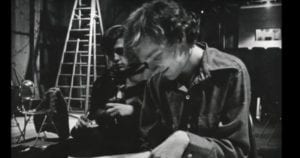In the new Rain Taxi, Douglas and Andy Fitch talk through the examples of Kathy Acker, Hart Crane, Gertrude Stein, Virginia Woolf, William Faulkner, and others. Narcissism. Writing sentences like painting. And how one gets involved in the work. Here’s an excerpted sample:
Andy Finch: … You mentioned the “you,” the figure of the “you,” and I always have admired how you, Douglas, succeed across your almost-autobiographical writing at slipping into myth. In this book, early on, Rilke emerges as “the one who wants to teach you how to slip into myth, will father you in that.” And this book’s immersion in the second person helps it slip into myth in a variety of ways. Across its historical triptych, “you” always remains: the character at hand, the embodied reader pulled across the text’s historical pivots, the reflective author consolidating and restructuring these narratives (more like you, Douglas). Also it seems, just from what you’ve said in the past, that this book might have some never-named real-world addressee, a “you” in your life at that time. So the “you” here stands for all of these multiple things in one. It becomes the papering over of a contradiction. That, if I remember Roland Barthes correctly, would fulfill one definition of myth.
Douglas Martin: It’s the most interesting subject-position in English to me, because it’s tense. You run a risk of mistaking yourself in front of it. For me, “I am an other,” and there’s Rimbaud, enacting that crisis constantly in front of my face. It’s always Lacan’s mirror stage. It creates a site where you yourself have to reflect on being distant from yourself, to cast yourself outside of yourself. You’ve taken something off. You’ve flown out of yourself.
 I like “you” also because it’s so impossible at times to discern if it’s singular or more plural, more general. It’s the thing in English that can do what the “on” can do in French—being a kind of permissive space, because ungendered, unmarked, not so freighted in certain ways. A tense that will allow me to get away with things in English that the “I” would trap me in. If you’re reading a book that I’ve written in the first person, without named characters, you will periodically perhaps as a reader remind yourself: Well, this is or isn’t the author. This is a character.
I like “you” also because it’s so impossible at times to discern if it’s singular or more plural, more general. It’s the thing in English that can do what the “on” can do in French—being a kind of permissive space, because ungendered, unmarked, not so freighted in certain ways. A tense that will allow me to get away with things in English that the “I” would trap me in. If you’re reading a book that I’ve written in the first person, without named characters, you will periodically perhaps as a reader remind yourself: Well, this is or isn’t the author. This is a character.
I think the second person turns that dynamic onto you, or situates it within you: This isn’t really me, but what aspect of the character is really me? That creates a loop of seduction, here thinking very much of Baudrillard’s book on the phenomenon. The circle wraps you within itself. It’s caught up in the lyric tradition for me. Why are we calling out? What are we calling out to? Are we calling out in the hope to be put back together? “I” asserts a distance “you” wants to bridge, to wit: Crane.
Read all of this conversation at Rain Taxi.







